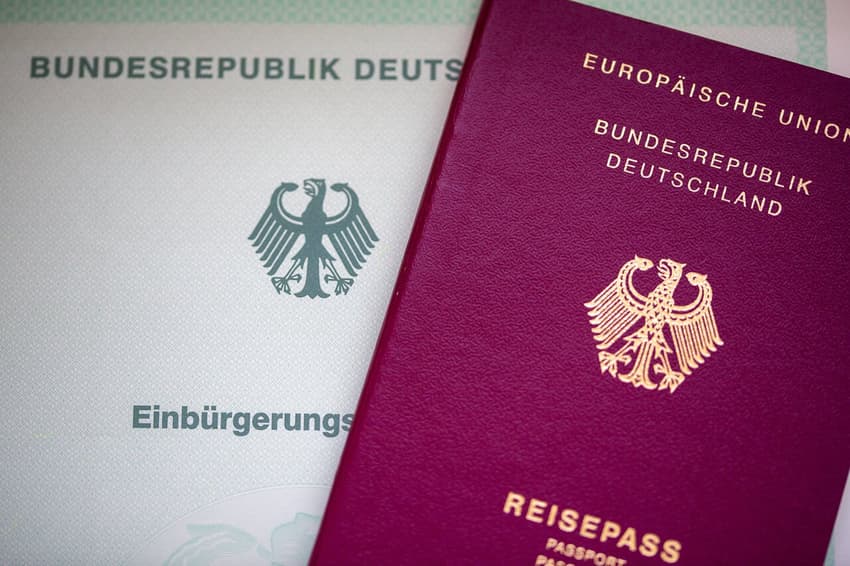Living in Germany: Citizenship law hits another delay, a historic day of fate and the letter 'ß'

In this week's roundup we look at what's going on with the dual citizenship law, Germany's most fateful day and interesting aspects of the letter 'ß'.
Living in Germany is our weekly look at some of the news and talking points in Germany that you might not have heard about. Members can receive it directly to their inbox on Saturday.
Will the new citizenship law make it into the Bundestag?
Germany’s citizenship reform hit another hurdle this week when it was revealed that the first reading in the Bundestag was taken off the agenda. It’s another setback for the landmark legislation that was delayed for cabinet deliberations earlier this year. The proposed law will result in big changes - the required residence for citizenship applicants is to be reduced from eight to five years (and three in some cases) and everyone will be allowed to hold more than one passport. The pause in the process is due to coalition partner, the Free Democrats (FDP), wanting to further tighten the requirements around anti-Semitism. Social Democrat MP Hakan Demir told The Local's Germany in Focus podcast: “The question mark that they have right now is if the new citizenship act is good enough to prevent anyone who is anti-semitic from getting German citizenship.”
The good news is that MPs have told us the law will be back on the parliamentary agenda soon. “The citizenship law is expected to be presented to the Bundestag for its first reading in a fortnight's time - so the week beginning November 27th," FDP’s Stephen Thomae said. So despite these delays, it looks like the legislation - which is one of the most significant for foreigners in Germany - will make it through the parliamentary process, even if the road is a little rocky.
Tweet of the week
If there’s one date you need to learn to get familiar with German history, it’s November 9th.
— Marcel Krueger (@kingofpain666) November 9, 2023
Where is this?

Photo: picture alliance/dpa | Bernd Weißbrod
There has been some stunning Herbst (autumn) weather in Germany recently, as can be seen in this view of Teck Castle or ‘Burg Teck’ surrounded by orange and green trees. Teck is an old Medieval castle built in what was previously the kingdom of Württemberg.
In 1519 the castle was conquered in the ‘War of the Swabian League’ and burned down in 1525 in the ‘Peasants' War’. In 1738 the Kirchheim Oberamt gave permission to demolish the castle, although some of the foundation walls were preserved. The castle was rebuilt in 1889 and it’s now a hostel and restaurant.
Did you know?
German speakers use the letter ß (eszett) frequently, but did you know that the letter is not used everywhere in the German-speaking world? Switzerland, unlike other German-speaking countries, doesn’t use the eszett. Some say that’s because the Swiss keyboard is adapted to the French alphabet, rather than the German one.
Instead, the Swiss always write the double s, making words like Masse/Maße and Busse/Buße, indistinguishable by spelling alone. In contrast, the eszett continues to be in use in other German-speaking nations, such as Austria and some parts of Belgium. To read more on this fascinating little letter, check out our article here.
Comments
See Also
Living in Germany is our weekly look at some of the news and talking points in Germany that you might not have heard about. Members can receive it directly to their inbox on Saturday.
Will the new citizenship law make it into the Bundestag?
Germany’s citizenship reform hit another hurdle this week when it was revealed that the first reading in the Bundestag was taken off the agenda. It’s another setback for the landmark legislation that was delayed for cabinet deliberations earlier this year. The proposed law will result in big changes - the required residence for citizenship applicants is to be reduced from eight to five years (and three in some cases) and everyone will be allowed to hold more than one passport. The pause in the process is due to coalition partner, the Free Democrats (FDP), wanting to further tighten the requirements around anti-Semitism. Social Democrat MP Hakan Demir told The Local's Germany in Focus podcast: “The question mark that they have right now is if the new citizenship act is good enough to prevent anyone who is anti-semitic from getting German citizenship.”
The good news is that MPs have told us the law will be back on the parliamentary agenda soon. “The citizenship law is expected to be presented to the Bundestag for its first reading in a fortnight's time - so the week beginning November 27th," FDP’s Stephen Thomae said. So despite these delays, it looks like the legislation - which is one of the most significant for foreigners in Germany - will make it through the parliamentary process, even if the road is a little rocky.
Tweet of the week
If there’s one date you need to learn to get familiar with German history, it’s November 9th.
— Marcel Krueger (@kingofpain666) November 9, 2023
Where is this?

There has been some stunning Herbst (autumn) weather in Germany recently, as can be seen in this view of Teck Castle or ‘Burg Teck’ surrounded by orange and green trees. Teck is an old Medieval castle built in what was previously the kingdom of Württemberg.
In 1519 the castle was conquered in the ‘War of the Swabian League’ and burned down in 1525 in the ‘Peasants' War’. In 1738 the Kirchheim Oberamt gave permission to demolish the castle, although some of the foundation walls were preserved. The castle was rebuilt in 1889 and it’s now a hostel and restaurant.
Did you know?
German speakers use the letter ß (eszett) frequently, but did you know that the letter is not used everywhere in the German-speaking world? Switzerland, unlike other German-speaking countries, doesn’t use the eszett. Some say that’s because the Swiss keyboard is adapted to the French alphabet, rather than the German one.
Instead, the Swiss always write the double s, making words like Masse/Maße and Busse/Buße, indistinguishable by spelling alone. In contrast, the eszett continues to be in use in other German-speaking nations, such as Austria and some parts of Belgium. To read more on this fascinating little letter, check out our article here.
Join the conversation in our comments section below. Share your own views and experience and if you have a question or suggestion for our journalists then email us at [email protected].
Please keep comments civil, constructive and on topic – and make sure to read our terms of use before getting involved.
Please log in here to leave a comment.